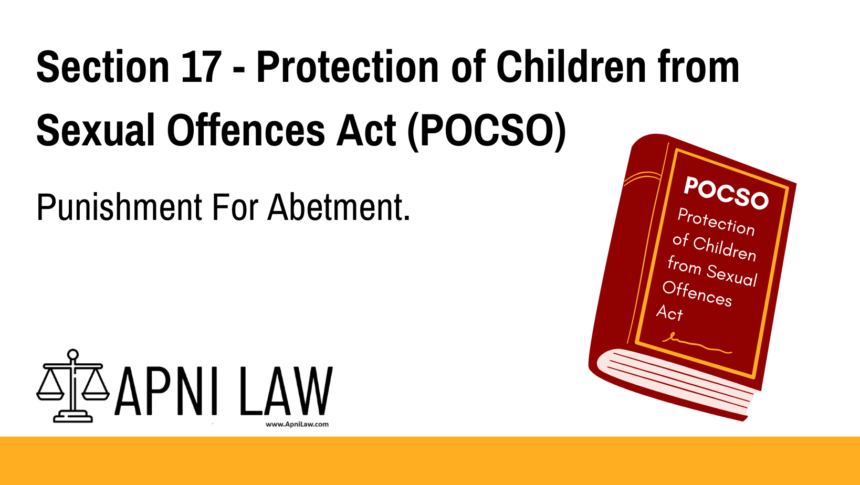Code: Section 17 POCSO Act
Whoever abets any offence under this Act, if the act abetted is committed in consequence of the abetment, shall be punished with punishment provided for that offence.
Explanation.— An act or offence is said to be committed in consequence of abetment, when it is committed in consequence of the instigation, or in pursuance of the conspiracy or with the aid, which constitutes the abetment.
Explanation of Section 17 POCSO
Section 17 of the Protection of Children from Sexual Offences Act, 2012 prescribes the punishment for abetment of offences under the Act. It makes it clear that if an offence is committed as a result of abetment—whether by instigation, conspiracy, or intentional aid—the person abetting the offence shall face the same punishment as the principal offender.
This provision strengthens accountability by ensuring that those who enable or encourage crimes against children are treated with the same seriousness as those who commit the acts directly.
It ties directly with Section 16 of the Act, which defines the term “abetment” in detail. Section 17 focuses on the consequence and liability arising from that abetment.
Key Provisions
- If any person abets an offence under the POCSO Act, and the offence is committed as a result of such abetment, the abettor is liable to the same punishment as the main offender.
- The section reinforces that instigation, conspiracy, or aiding is sufficient ground for equivalent punishment.
- The explanation clarifies that the act must be a consequence of the abetment (not merely associated).
Illustration
Example 1: Instigation Leading to Abuse
A man persuades another to molest a child, and the act is subsequently carried out. Though he did not physically touch the child, the instigator is liable for the same punishment as the molester under Section 17.
Example 2: Conspiracy and Execution
A group conspires to create exploitative content involving minors. One member arranges the setup, while another executes the act. All conspirators are punishable equally if the offence is committed in pursuance of their plan.
Example 3: Aiding through Omissions
A school staff member allows unauthorized persons into the premises, knowing they plan to abuse a child. If the offence is committed, the staff member is equally liable due to their aiding the offence.
Common Questions & Answers
1. What if the abetment did not result in the actual offence?
Section 17 applies only when the offence is committed in consequence of the abetment. If the offence was not committed, the person may still be punished under attempt or preparatory laws but not under this section specifically.
2. Is the punishment always equal to the main offence?
Yes. If the offence is committed because of the abetment, the abettor receives the same punishment as the person who committed the act.
3. How is abetment established in court?
The prosecution must prove that the accused instigated, conspired, or aided the offence and that the act was committed as a direct result of such abetment.
4. Does this cover digital abetment (online encouragement or planning)?
Yes. Abetment via digital or electronic means, such as encouraging an offence over messaging or coordinating abuse online, also falls under this section if it leads to the offence being committed.
5. Is there any difference between attempt and abetment?
Yes. Attempt refers to directly trying to commit the offence. Abetment refers to enabling or encouraging another to commit the act. Both are punishable, but under different sections depending on the facts.
Conclusion
Section 17 of the POCSO Act plays a crucial role in ensuring that not only perpetrators but also abettors of sexual offences against children are held equally responsible. It reinforces that enabling such crimes—through conspiracy, encouragement, or assistance—is a grave offence in itself and attracts the same punishment as the act committed.
To stay updated on legal rights, criminal law, and child protection legislation, visit ApniLaw.








